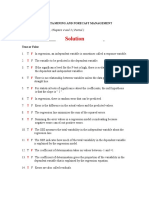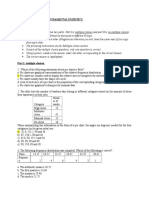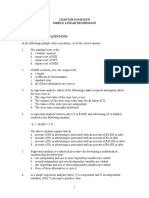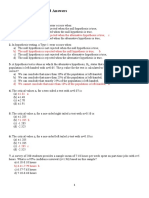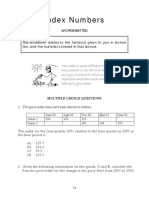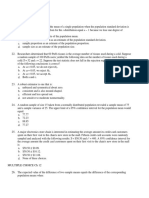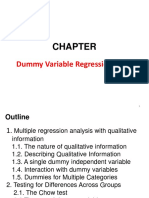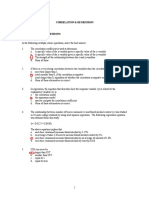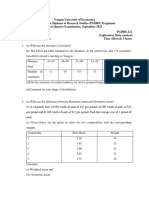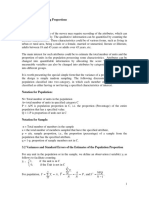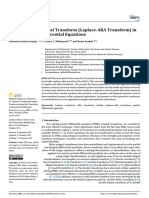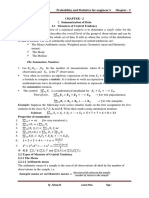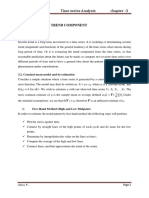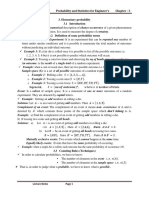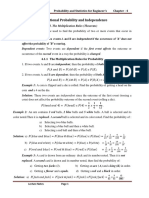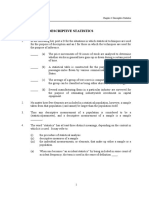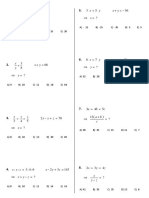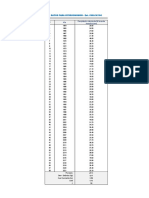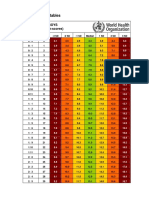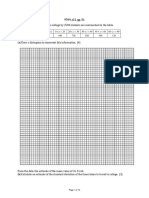1
MIZAN -TEPI UNIVERSITY COLLEGE OF NATURAL AND COMPUTATIONAL SCIENCE
DEPARTMENT OF STATISTICS
Introduction to Statistics for engineer's Worksheet I
1.
The investigator was interested in studying the marital status, which is often grouped as
(
),
(
),
(
),
(
)
of people in a certain town. The following data were obtained.
.
a)
To which scale of measurement do these data belong? b)
Summarize the data by constructing the appropriate frequency distribution. c)
Present the data using the appropriate graph/diagrams. 2.
The following data represents the scores of marks that an instructor gives a ten point test for statistics students in stat 1071 course (use sturge's formula).
2.05
2.01 2.43 2.63 2.5 3.25 3 3.32 2.73 2.7 2.85 2.95 4.64 5.27
2.9
3.6 3.58 3.62 3.4 3.34 3.45 3.85 3.5 4.1 4.08 4.12 4.62 5.25
3.83
3.75 3.94 4.07 4.05 5.15 4.54 5.2 3.99 3.97 4 4.55 4.7 6.4
4.58
5.5 5.05 5.55 4.2 4.15 4.25 5 4.9 6.5 5.35 5.85 5.3 5.8 a)
Construct a frequency table and find the cumulative relative frequency. b)
Construct a histogram, frequency polygon and an Ogive curve. 3.
Suppose the data collected for heights (in cm) of 390 men were tabulated in a frequency distribution and the following results were obtained.
:
6
25
48
72
116
60
38
22
3
= 112
,
= 117
ℎ
ℎ
(
).
Determine:
a)
The width of the class intervals b) The class limits c)
Class boundaries d) Class marks. e)
The less than frequency distribution f)
Above which height do we find 50% of the men. g)
Below which height do we get 25% of the men.
Draw:
a) Histogram, frequency polygon and an Ogive curve for the data. 4.
Suppose that
Mr. X
pays
15 cents/kw for his electricity and
Mr.Y
pays
20 cents/kw: a)
If
Mr. X consumed
50kw and
Mr. Y consumed
120 kw. Find the average cost per kw. b)
If
Mr. X pays
10 birr and
Mr. Y pays
15 birr at the indicated rates, what is the average cost per kw.

2
5.
a) Determine the
missing
frequencies of the following distribution given that the
median is 33.5 and the mode is 34.
Class limits
0-9 10-19 20-29 30-39 40-49 50-59 60-69
Total
4 16
6 4
230
b) Compute the mean. c) Compute the median and all quartiles. 6.
The following data on income in the form of cumulative frequency distribution is given.
Income (CI) 100-200 100-300 100-400 100-500 100-600 No of persons 15 33 63 83 100
Find:
a) Construct a complete grouped frequency table. b) The 2
nd
and 8
th
deciles. c) The 40
th
and 90
th
percentiles. 7.
In a certain test the
pass mark
is 30. The distribution of marks of
passing
candidates classified by sex is given below. The
overall (combined)
mean marks for boys including the
20 failed
were 39. The corresponding figure for girls including the
10 failed
were 37. a) Find the mean marks obtained by the 20 boys who
failed
in the test. b) Find the mean marks obtained by the 10 girls who
failed
in the test.
Marks
30-34 35-39 40-44 45-49 50-54 55-59
otal Boys
5 10 15 30 5 5
70 Girls
15 20 30 20 4 1
90
8.
(I) Compute the range, the variance, the standard deviation and the coefficient of variation for the following data.
)
:
1, 3, 12, 2, 8
6
)
:
3, 6, 2, 1,7
4
c)
d)
Items (x
i
)
122 131 140 149
i
3 5 9 12
Find:
I.
The
combined
mean for sets A and B.
II.
If we
add 5
to each of the numbers in
set A
, we obtain
:
6,8,17,7,13
11
, show that the two sets (i.e. A & C) have the
same
variance but
different
means. how are the means related?
9.
In a certain examination, the average mark of students in section A is 68.4 and the average mark of students in section B is 71.2. If the average mark of
both sections
combined is 70, find the ratio of the number of students in section A to the number of students in B. 10.
A meteorologist are interested to study the consistency of temperatures in two cities during a given week and collected the following data.
:
25
24
23
26
17
:
22
21
24
22
20
a) For which city is the temperature more consistent, based on these data?
CI
60-62 63-65 66-68 69-71
i
5 18 42 27















